|
The RIBI
magazine, known today simply as ‘Rotary’, began life in January
1915 as ‘The Rotary Wheel’. No less than three of its editors
have went on to write on Rotary Global History –
David Shelly Nicholl’s
The Golden Wheel;
Roger Levy
Rotary International in Great
Britain and Ireland; and Vivian Carter in
The Romance of
Rotary In London.
But it was
Thomas Stephenson of Edinburgh Rotary Club who has the honour of being
its first editor. Like Chesley Perry in Chicago, Stephenson also filled
the role of secretary (and treasurer). Due to generous advertisers, the
magazine initially operated at a profit.
The first
issue (to be issued at ‘intervals’ by the British Association of Rotary
Clubs {BARC}) contained a list of the 46 Rotarians involved in the Great
War. In a 1919 issue it was reported that 195 British Rotarians from 17
Clubs had served in the forces. 12 had made the ultimate sacrifice.
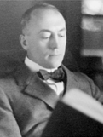 Inside the
first issue, was an article (first appearing in The Rotarian) by
Ernie Skeel of Seattle Rotary Club arguing for the single classification
rule to be scrapped. Skeel argued that the rule was disastrous for
Rotary’s future. The editor, Stephenson, rejected Skeel’s analysis but
offered some hope to the writer by offering the possibility (later,
reality) of subdividing classifications. The magazine received 20
letters in response to Skeel’s proposal all rejected his argument. Inside the
first issue, was an article (first appearing in The Rotarian) by
Ernie Skeel of Seattle Rotary Club arguing for the single classification
rule to be scrapped. Skeel argued that the rule was disastrous for
Rotary’s future. The editor, Stephenson, rejected Skeel’s analysis but
offered some hope to the writer by offering the possibility (later,
reality) of subdividing classifications. The magazine received 20
letters in response to Skeel’s proposal all rejected his argument.
Thus, from
the first issue, a precedent was set whereby articles critical to Rotary
(from both outside and within the movement) would be published. There
was another early decision taken by the editor. Potential advertisers
should place their adverts not for sentimental reasons but for business
ones. It was accepted policy from then on that the magazine does not
allow advertisers to indicate whether or not they are Rotarians.
Another
early feature focussed on the proposal of UK conversion to the metric
system. The directors of B.A.R.C. wrote to the Director-General of
National Service offering to serve on any committees set up to consider
such ideas. The Association heard nothing from the D-G, (future Prime
Minister Neville Chamberlain) which may seem a little unexpected as
Chamberlain was an honorary member of the Rotary Club of Birmingham.
Stephenson’s hectic Rotary duties did not stop him from writing in March
1917 an article entitled Rotary: its History, its Interpretation and
its Possibilities. Stephenson would offer a unique definition of
Rotary arguing that service and benefits ‘rotate’ around its members.
The April
1917 saw “a message of sympathy and good-will from British Rotary to
American Rotary” as the USA took up arms. The leading article –
described as ‘tactless’ by Roger Levy- declared that American Rotarians
now had “a real serious object to work for”.
By 1918 the
magazine was calling for Rotary extension and also a large attendance at
the Kansas City Convention – two British Rotarians
(Secretary/Treasurer/Editor Tom Stephenson and Vice-President
Home-Morton) travelled to the event. Interestingly, the British
delegation had their expenses paid for by the Foreign Office who,
perhaps cynically, saw the advantage of British Rotary’s close relations
with their American cousins.
Arthur
Young of Leicester Rotary Club wrote a letter to the November 1917
Rotary Wheel calling for the standardisation of the Rotary badge
–“If each Club is to be allowed to distort the Rotary sign at its own
sweet will this wheel will soon cease, I think, to be the emblem of
Rotary. This suggestion would be adopted with usual Rotary haste some 3
years later.
Some
notable sentences from the second oldest Rotary publication that stand
out during these war years include:
‘Capital
must be educated to understand that labour is something more than merely
its paid tool.’
‘The Jew is
not a drunkard.’
‘Where
women do the work of men equally well, they should have equal pay.’
‘The second
way in which syphilis is transmitted is by kissing. In Russia, 75-80% of
cases occur by kissing.’
Stephenson
would soon find the pressures of doing three separate jobs too much and
handed over editorship to Leeds Rotarian Thomas S Barber, Chairman of
the Publications Committee in 1919.
By the end
of the 1920’s The Rotary Wheel magazine sacrificed almost half of
its space towards Club activities. The clubs, alas, in their letters
were not edited in the early years and often irritated the readers.
There were criticisms of badly written articles and ‘piffle’. The Clubs
were not worth the space some readers claimed while others would talk of
“Parish Church effusions”.
After Vivian Carter left the editor’s
job for Chicago in 1928 after 5 years came the poet and playwright
W.W. Blair-Fish. ‘Blair’ as he was known edited the Rotary
publications until 1942 and served as British Rotary’s secretary between
1927 and 1937. Blair was an excellent writer – described by many as an
idealist- and unashamedly forced many literary figures to write articles
for his magazines. He left much of the content to others but wrote
powerful editorials. Under Blair’s leadership, a new quarterly magazine
was initiated in 1932 entitled Service in Life and Work. Blair
was rightly proud of this magazine which it was hoped would attract
non-Rotarian readers and went on public sale but to no avail. The
magazine would often bring together two writers to argue different
points of view over an issue. Eventually, with the outbreak of war in
1939, both RIBI magazines would be amalgamated under the title of
Rotary Service.
|
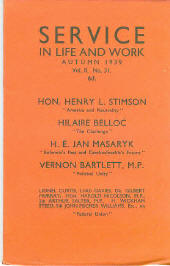
It is
essential that we do not forget the name of W.W. Blair-Fish because
unbelievable as it is, Rotary did!
When he
died aged 78 no Rotarian attended his funeral and only two former
colleagues from the magazine staff joined the mourners. This is
according to the modest Roger Levy (editor of the RIBI magazine between
1947-1975) who I shall presume was one of the two who did attend.
Blair-Fish is the forgotten man of
British Rotary. He was an ‘articulate dreamer’ who according to one of
his successors “did as much as anyone to provide literature and give
direction to Rotary thinking when such guidance was most needed.”
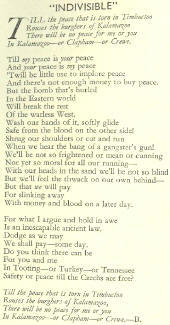
A
Blair-Fish poem
The fall of
Blair-Fish occurred in January 1942 and stems from his forceful
editorial stance. Blair attacked American Rotary’s neutral stance in
early World War Two. This was a ‘Rotary War’ according to Blair. In
December 1941, the President of Sand Spring, Oklahoma wrote a letter
that visibly angered Blair-Fish. It said (correctly) that Americans did
not want to send their sons to die on the fields of Europe and went on
to suggest that Britain did not wish to fight as they had already lost
13 battles to the Germans.
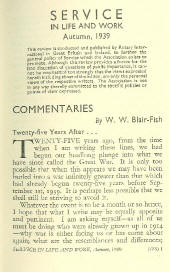
The
Blair-Fish commentary from September 1st 1939
Blair-Fish
answered in his editorial entitled “Now is the Lesson Learned?”
referring, of course, to the US entry into the war after Pearl Harbour.
The furious editor exclaimed that “Neutrality is treason to
civilisation”.
This
Blair-Fish poem, which appeared in Rotary Service in 1940, must
also have upset the higher powers in
Chicago.
We are a
little tired
Of being
admired
The
sincerest form of flattery of our nation
Would be
imitation…
The epic message much sustains
Our
courage – but, when war is made
Kind
hearts are less than aeroplanes
And
simple faith than foreign aid.
This would
be his last editorial for in the same January 1942 issue, it was
announced that Blair-Fish “shall not be required to edit any further
issues”. Levy tells us that Blair had resigned but in reality as Nicholl
points out he was dismissed. Nicholl, another successor to Blair-Fish,
pulls no punches -his dismissal (by the RIBI General Council) was “a
disgraceful and complete contradiction of all the Western world was
supposed to be fighting for.
Blair-Fish
briefly appeared in 1966 when he wrote another controversial article for
Rotary entitled “Central Control: RI’s Inveterate Vendetta”. Here
was a man that knew how to ‘rattle cages’.
Calum Thomson
Other reference to Blair:
History of RIBI
London 1928
Europe 1932
South
Africa 1934
|
The continuation of
the actual commentary by Blair-Fish |
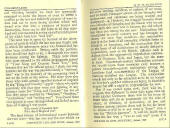 |
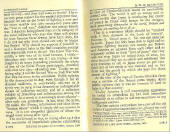 |
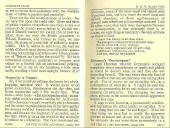 |
 |
|

